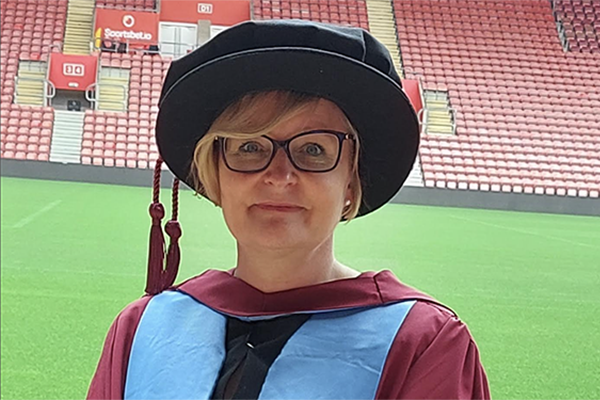New research opportunities

Opportunity knocks: an extended version of the article published in the May/June 2025 issue of The Podiatrist on why research is important
Dr Lisa Ledger is Assistant Director of Allied Health Professions (AHPs) at the National Institute for Health and Care Research (NIHR). With an additional £30m per year of funding committed to help health and care professionals open doors to new opportunities, she explains how NIHR can support you to become skilled in research.
Tell us about your new role and how you envisage it shaping the future of AHP research in the UK.
This new role is really exciting and demonstrates the commitment of the National Institute for Health and Care Research (NIHR) to supporting the more underrepresented professions, such as AHPs.
The key aim is to develop and implement national initiatives to support the development of AHP research capacity and capability. The role is broad and far-reaching, and includes working as an ambassador within NIHR, and externally, to strategically position, promote and lead the momentum of AHP research at a national level.
There is a key focus on equity, inclusion and belonging to ensure NIHR academic research opportunities reach the practitioners, areas and communities where they are most needed.
The role will be instrumental in shaping AHP research. It has a wide strategic reach, encompassing all 14 allied health professions, and will be a conduit for change.
I will be championing exciting initiatives such as the NIHR AHP Developing Research Leaders Programme, which will start this September. The programme is for AHPs who aspire to become research leaders in health or social care, with a particular focus on attracting the smaller professional groups to the programme. We are looking for individuals committed to promoting a positive research culture, and building research capacity and capability in their organisations.
Tell us about your own journey from AHP practitioner to researcher.
My journey from practitioner to researcher has spanned several years. I am a qualified occupational therapist and have worked within community, acute and rehabilitation settings over the past 28 years.
Using the best evidence to base my practice on has been really important throughout my career.
I feel passionately that we can only be assured of providing the best care and intervention to our patients, families and communities through adopting a research-informed approach.
I was less confident in research early on in my career but got involved in aspects of it such as audits and journal clubs. Over time, I moved into specialist posture and seating services where I discovered a real passion for person-centred practice and pressure ulcer prevention. This passion drove my PhD topic and determination to make a contribution to the knowledge and resultant practice within this field.
Why do you feel it’s important for AHPs to incorporate research into their practice?
Research should be embedded and incorporated in all that we do. We know that by ensuring research-informed practice is based on the most up-to-date knowledge it optimises patient outcomes and patient experience.
Being involved in research as an AHP in any capacity is really exciting and rewarding. It promotes better work satisfaction and helps with job retention. It also allows AHPs to build confidence and skills, leading to different career opportunities and experiences. Embedding research into practice is paramount to deliver the best outcomes for patients and raise the profile of research within podiatry as a profession.
What are the challenges facing AHPs pursuing research careers and how can you address these?
Some of the challenges include protected time for research and staffing shortages that create issues for timely backfill. There is also a challenge around research culture and the priority that research activity is given against clinical priorities.
As podiatrists work across a range of settings, this can, at times, create some challenges in accessing research opportunities and funding.
I hope to address some of these barriers by working closely with the AHP community, professional bodies, AHP leaders, NHS England and the Community for Allied Health Professions Research (CAHPR) to ensure all 14 professions have a voice and are involved in NIHR AHP developments.
It is important that the language we use and how we engage with AHP communities is open, inclusive and ‘speaks’ to all practitioners. The new Developing Research Leaders Programme for AHPs will be a key enabler for practitioners to be part of research mobilisation in their areas, localities and organisations, and inspire and grow the next generation of research leaders.
What’s your advice for a podiatrist thinking about a career in research?
My main advice would be to feel the fear and do it anyway. Research can, for some, feel out of reach or just for academics, which is not the case. Start small by talking to colleagues about your aspirations and research ideas. Most trainees have to do research during their training, and it is important to find communities of practice for support and to continue to be research-active. CAHPR is also a really good point of contact with resources and contacts for support.
There are many different resources available to help you. NIHR provides help and support for AHPs to develop research careers. This includes:
- Courses and qualifications for those taking their first steps in research
- Flexible training programmes to enable AHPs to balance a research and practice-based career
- Support to help AHPs gain skills and experience along their academic career path
- Research data and publications from NIHR-funded research
- Research leadership programmes for AHPs
RCPod’s 2025-2030 strategy has research as one of its key areas of focus. Find out more about NIHR’s AHP offering by visiting: www.nihr.ac.uk/career-development/support-by-profession/allied-health-professionals
